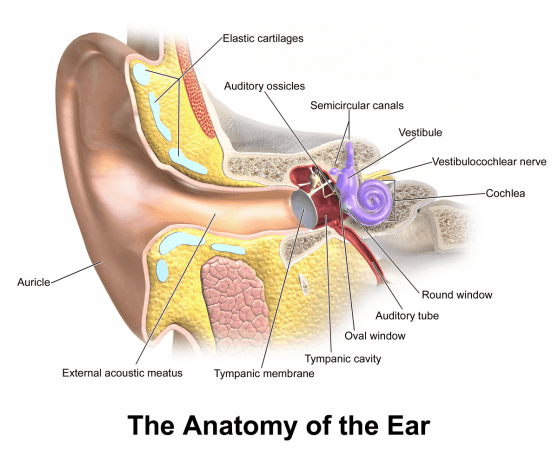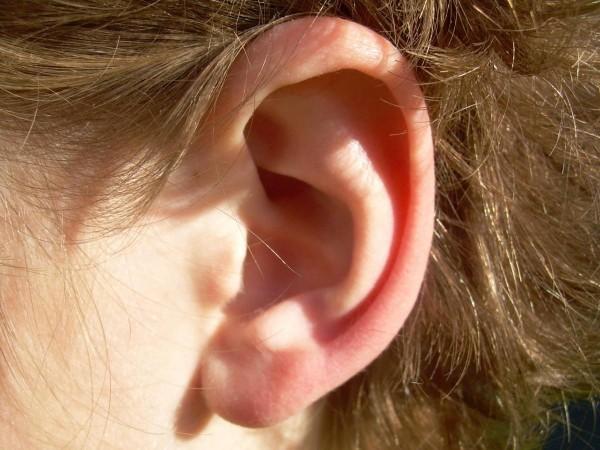It is common knowledge that exposure to loud noises can result in loss of hearing. Interestingly, some regular forms such as booming music, firecrackers, and heavy machinery are also the most preventable causes of hearing impairment. Now, a new study has reported that exposure to common sounds can cause the buildup of fluid in the inner ear and lead to hearing loss.
Through a new study, researchers have discovered that exposure to common everyday sounds measuring 100 decibels can promote fluid buildup in the inner ear. This in turn leads to damage of auditory nerves cells over time, which ultimately gives rise to loss of hearing. The animal study, therefore, linked hearing loss to both loud noises and the buildup of fluid in the inner ear.
"This research provides clues to better understand how and when noise-induced damage to the ears occurs and suggests new ways to detect and prevent hearing loss," said Dr. John Oghalai, lead author of the study, in a statement. The findings were published in the journal Frontiers in Cell and Developmental Biology.
Noise and Hearing Impairment

The inner ear is the deepest part of the ear. Also known as the 'labyrinth of the ear', it is responsible for the transmission of acoustic information to the brain. It consists of sensitive organs—the cochlea, semicircular canals, and vestibule—that are responsible for hearing and maintenance of equilibrium.
Two kinds of fluids, separated by a thin membrane, exist in the inner year—endolymph (inner fluid) and perilymph (outer fluid). A condition known as endolymphatic hydrops, which is the buildup of endolymph, can cause nerve damage within the inner ear. Loud noises can also result in the loss of auditory nerve cells in this part of the ear. However, the mechanism behind hearing loss is not understood entirely.
An older study conducted by Dr. Oghalai involved the exposure of mice to blast pressure waves that simulated a bomb explosion. The research connected nerve damage with fluid buildup in the inner ear. Through the current study, the team aimed to study the effect of common loud sounds on the ear.
Effect of Common Noises

For the study, the authors exposed mice to sounds within the range of 80 to 100 decibels for a duration of two hours daily over the course of one week. Following this exposure, the amount of inner ear fluid buildup in the cochlea—the hollow and spiral-shaped bone within the inner ear—was measured using an imaging technique known as optical coherence tomography.
It was found that the quantity of inner ear fluid remained normal for exposures of up to 95 decibels. However, it was discovered that following exposure to sounds measuring 100 decibels, which is equivalent to everyday noises such as those from chain saws, motorcycles, and power lawn mowers, a buildup of inner ear fluid occurred in the mice. After the week-long exposure to these levels of sound, the rodents eventually lost auditory nerve cells.
In order to ascertain whether the hearing loss could be reversed or prevented, the researchers turned to hypertonic saline: a strong sterile solution of sodium chloride (NaCl) that is used to manage nasal congestion in humans. When the solution was introduced into the ears of noise-exposed animals an hour after exposure, the immediate buildup of fluid and the long-term nerve damage were found to decrease. This suggested that at least a partial prevention of hearing may be possible.
Offering New Insights

According to the researchers, the study has several crucial implications. Dr. Oghalai emphasized that the findings are particularly significant in the case of 'hidden hearing loss', or the loss of nerve cells in the inner ear, as hearing tests fail to detect damage caused within the ear.
"First, if human ears exposed to loud noise, such as a siren or airbag deployment, can be scanned for a level of fluid buildup — and this technology is already being tested out — medical professionals may have a way of diagnosing impending nerve damage. Secondly, if the scan discovered fluid buildup, people could be treated with hypertonic saline and possibly save their hearing," he averred.
Dr. Oghalai stressed that the results also have the potential to provide an improved understanding of Meniere's disease, another inner ear disorder. It causes hearing loss, tinnitus (ringing in the ears), and vertigo (spells of dizziness). "Previously, inner ear fluid buildup was thought to be primarily linked to Meniere's disease. This study indicates that people exposed to loud noises experience similar changes," he concluded.













!['He is done with the team now' : Angry Virat Kohli slams the bat, kicks the ground, yells at RCB team as SRH smashes runs [reactions]](https://data1.ibtimes.co.in/en/full/796956/he-done-team-now-angry-virat-kohli-slams-bat-kicks-ground-yells-rcb-team-srh-smashes.jpg?w=220&h=138)



